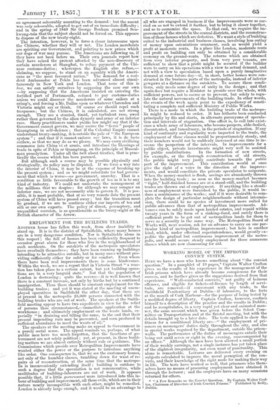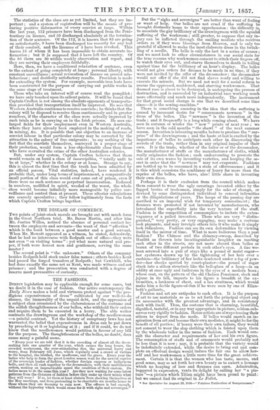WORKING MODEL OF THE IMPROVED CONVICT SYSTEM.
HERE we have a man who knows something about "the convict question." In a pamphlet of 19 ,pages,' Captain Walter Crofton gives us the results of his experience in the management of the Irish prisons which have already become conspicuous for their success, and he further gives us the suggestions derived from that experience. "Well-conducted convicts," not guilty of heinous offences, and eligible for tickets-of-licence by length of servitude, are removed—if conversant with any trade, to the Smithfield Penitentiary at Dublin—if labourers, to the forts at the mouth of Cork Harbour—for the purpose of being tested by a modified degree of liberty. Captain Crofton, however, confines himself to a description of the practice and the results in Dublin; and he recapitulates, in a very rapid yet clear and animated manner, the same account which was given before the Select Committee on Transportation and at the Bristol meeting, but with the details brought up to a later date. The tests applied to show tho fitness for a conditional liberty arc—" the employment of prisoners on messengers' duties daily throughout the city, and also in special works required by the department, outside the prisonwalls. The performance of the duties of messengers entails their being out until seven or eight in the evening, unaccompanied by an officer." Although the men have been allowed a small portion of their weekly earnings, not a single instance has yet taken place of the slightest irregularity, not even want of punctuality.. This alone is remarkable. Lectures are delivered every evening on subjects calculated to improve the moral pereeption of the convicts, and their knowledge of the right mode for making their way in life. The tests have worked 80 well, that prisoners who themselves have no means of procuring employment have obtained it through the lecturer; and the employers have on many occasions returned for others.
• "A Few Remarks on the Convict Question. By Captain Walter Crofton, Chairman of Directors of Dish Convict Prisons." Published by Kelly, Dublin. • The statistics of the class are as yet limited, but they are important; and a system of registration will be the means of procuring positive information of every convict at large. Within the last year, 112 prisoners have been discharged from the Penitentiary on licence, and 55 discharged absolutely at the termination of their sentence. Of the 112, it is known that 85 are going on satisfactorily, 9 have been discharged too recently for any test of their conduct, and the licences of 5 have been revoked. This leaves 13 of whom it has been impossible to obtain accurate information; but it is supposed that 5 have left the country. Of the 85 there are 30 within weekly observation and, report, and they are serving their employers faithfully. Here, then, we have a conditional relaxation of sentence, even to the extent of going completely at large ; personal liberty, with constant surveillance ; actual revocation, of licence on proved misbehaviour; and decidedly satisfactory results. Provision is made for extending the system. For example, moveable iron huts have been constructed for the purpose of carrying out public works in the same stage of treatment.
Those who take an interest will of course read the pamphlet ; we have only touched upon its salient points. It will be found that Captain Crofton is not among the absolute opponents of transportation provided that transportation itself be improved. He sees that Western Australia continues to receive convicts ; he thinks that the colony will be disposed to receive them continuously and in greater numbers, if the character of the crass were actually improved by such trials as he is carrying on in the Irish prisons. He sees enlarged fields for their employment even in Western Australia, where they have already been employed in the making of roads, ht mining, dm. It is possible that one objection to an increase of convict labour in that particular colony may be corrected by the attraction to the colony of free emigrants ; to say nothing of the fact that the convicts themselves, conveyed in a proper stage of their probation, would form a less objectionable class than those who have recruited the crime of the other Australian colonies.
But, wider any system, Captain Crofton believes that there would remain on hand a class of incorrigibles, "totally unfit to be at large," whether in the colony or at home. Strange to say, this is almost the first time that the truth has been admitted by an official person. Vital statistics, indeed, have rendered it probable that, under long terms of imprisonment, a comparatively small portion of this class would ever come out of prison, even if there were no such sentence as perpetual incarceration. Reduced in numbers, mollified in spirit, weeded of the worst, the whole class would become infinitely more manageable by police surveillance and control than at present. These ulterior calculations are scarcely speculative ; they follow legitimately from the facts which Captain Crofton brings together.



























 Previous page
Previous page